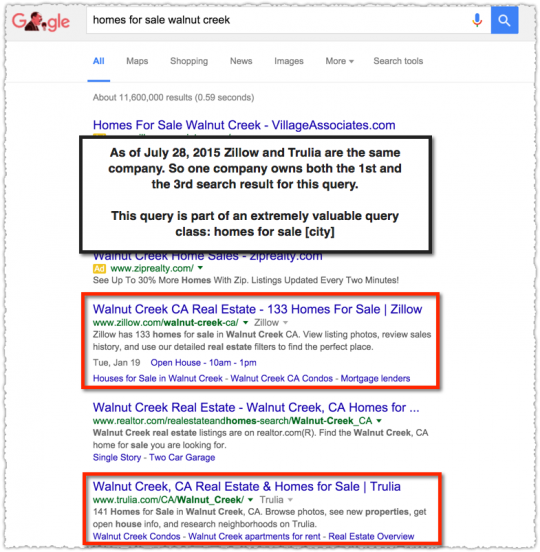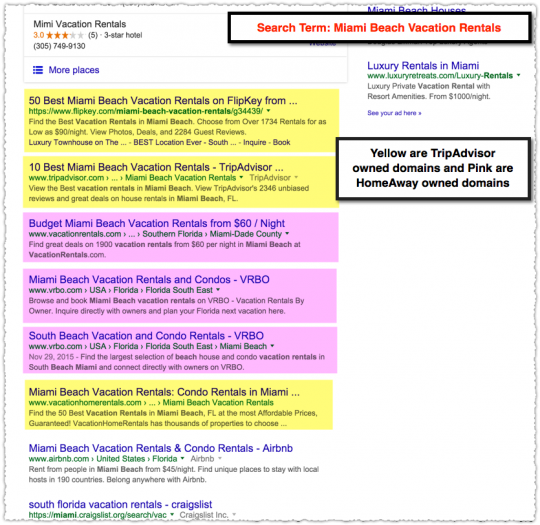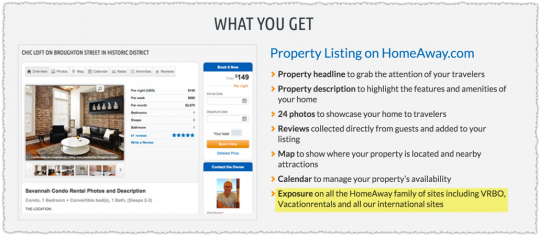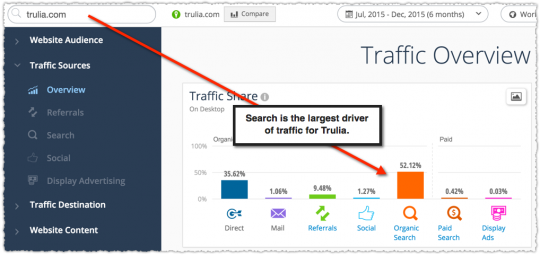There’s an old saying that if you can’t beat ’em, join ’em. But in search, that saying is often turning into something different.
If you can’t beat ’em, buy ’em.
Acquisition search engine optimization is happening more often as companies acquire or merge, effectively taking over shelf space on search results. Why settle for having the top result on an important term when I can have the first and second result?

Should this trend continue you could find search results where only a handful of companies are represented on the first page. That undermines search diversity, one of the fundamentals of Google’s algorithm.
This type of ‘business crowding’ creates false choice and is vastly more dangerous than the purported dread brought on by a filter bubble.
Acquisition SEO
SEO stands for search engine optimization. Generally, that’s meant to convey the idea that you’re working on getting a site to be visible and rank well in search engines.
However, you might see diminishing returns when you’re near the top of the results in important query classes. Maybe the battle with a competitor for those top slots is so close that the effort to move the needle is essentially ROI negative.
In these instances, more and more often, the way to increase search engine traffic, and continue on a growth trajectory, is through an acquisition.

That’s not to say that Zillow or Trulia is doing anything wrong. But it brings up a lot of thorny questions.
Search Shelf Space

About seven years ago I had an opportunity to see acquisition SEO up close and personal. Caring.com acquired Gilbert Guide and suddenly we had two results on the first page for an important query class in the senior housing space.
It’s hard not to get Montgomery Burns at that point and look at how you can dominate search results by having two sites. All roads lead to Rome as they say.
I could even rationalize that the inventory provided on each platform was different. A venn diagram would show a substantial overlap but there was plenty of non-shaded areas.
But who wants to maintain two sets of inventory? That’s a lot of operational and technical overhead. Soon you figure out that it’s probably better to have one set of inventory and syndicate it across both sites. Cost reduction and efficiency are powerful business tenets.
At that point the sites are, essentially, the same. They offer the same content (the inventory of senior housing options) but with different wrappers. It idea was awesome but also made my stomach hurt.
(Please note that this is not how these two sites are configured today.)
Host Crowding

The funny thing is that if I’d tried to do this with a subdomain on Caring.com I’d have run afoul of something Google calls host crowding.
Matt Cutts wrote about this back in 2007 in a post about subdomains and subdirectories.
For several years Google has used something called “host crowding,” which means that Google will show up to two results from each hostname/subdomain of a domain name. That approach works very well to show 1-2 results from a subdomain, but we did hear complaints that for some types of searches (e.g. esoteric or long-tail searches), Google could return a search page with lots of results all from one domain. In the last few weeks we changed our algorithms to make that less likely to happen.
In essence, you shouldn’t be able to crowd out competitors on a search result through the use of multiple subdomains. Now, host crowding or clustering as it’s sometimes called has seen an ebb and flow over time.
In 2010 Google loosened host crowding constraints when a domain was included in the query.
For queries that indicate a strong user interest in a particular domain, like [exhibitions at amnh], we’ll now show more results from the relevant site.
At the time Google showed 7 from amnh.org. Today they show 9.
In 2012 they tweaked things again to improve diversity but that didn’t make much of a dent and Matt was again talking about changes to host clustering in 2013. I think a good deal of the feedback was around the domination of Yelp.
I know I was complaining. My test Yelp query is [haircut concord ca], which currently returns 6 results from Yelp. (It’s 8 if you add the ‘&filter=0’ parameter on the end of the URL.)
I still maintain that this is not useful and that it would be far better to show fewer results from Yelp and/or place many of those Yelp results as sitelinks under one canonical Yelp result.
But I digress.
Business Crowding

The problem here is that acquisition SEO doesn’t violate host crowding in the strict sense. The sites are on completely different domains. So a traditional host crowding algorithm wouldn’t group or cluster those sites together.
But make no mistake, the result is essentially the same. Except this time it’s not the same site. It’s the same business.
Business crowding is the advanced form of host crowding.
It can actually be worse since you could be getting the same content delivered from the same company under different domains.
The diversity of that result goes down and users probably don’t realize it.
Doorway Pages
When you think about it, business crowding essentially meets the definition of a doorway page.
Doorways are sites or pages created to rank highly for specific search queries. They are bad for users because they can lead to multiple similar pages in user search results, where each result ends up taking the user to essentially the same destination.
When participating in business crowding you do have similar pages in search results where the user is taken to the same content. It’s not the same destination but the net result is essentially the same. One of the examples cited lends more credence to this idea.
Having multiple domain names or pages targeted at specific regions or cities that funnel users to one page
In business crowding you certainly have multiple domain names but there’s no funnel necessary. The content is effectively the same on those multiple domains.
Business crowding doesn’t meet the letter of the doorway page guidelines but it seems to meet the spirt of them.
Where To Draw The Line?

This isn’t a cut and dry issue. There’s quite a bit of nuance involved if you were to address business crowding. Lets take my example above from Caring.
If the inventory of Caring and Gilbert Guide were never syndicated, would that exempt them from business crowding? If the inventories became very similar over time, would it still be okay?
In essence, if the other company is run independently, then perhaps you can continue to take up search shelf space.
But what prevents a company from doing this multiple times and owning 3, 4 or even 5 sites ranking on the first page for a search result? Even if they’re independently run, over time it will make it more difficult for others to disrupt that space since the incumbents have no real motivation to improve.
With so many properties they’re very happy with the status quo and are likely not too concerned with any one site’s position in search as long as the group of sites continues to squeeze out the competition.
Perhaps you could determine if the functionality and features of the sites was materially different. But that would be pretty darn difficult to do algorithmically.
Or is it simply time based? You get to have multiple domains and participate in business crowding for up to, say, one year after the acquistion. That would be relatively straight-forward but would have a tremendous impact on the mergers and acquisitions space.
If Zillow knew that they could only count on the traffic from Trulia for one year after the acquisition they probably wouldn’t have paid $3.5 billion (yes that’s a ‘b’) for Trulia. In fact, the deal might not have gotten done at all.
So when we start talking about addressing this problem it spills out of search and into finance pretty quickly.
What’s Good For The User?
At the end of the day Google wants to do what is best for the user. Some of this is altruistic. Trust me, if you talk to some of the folks on Google’s search quality team, they’re serious about this. But obviously if the user is happy then they return to Google and perform more searches that wind up padding Google’s profits.
Doing good by the user is doing good for the business.
My guess is that most users don’t realize that business crowding is taking place. They may pogostick from one site to the other and wind up satisfied, even if those sites are owned by the same company. In other words, search results with business crowding may wind up producing good long click and time to long click metrics.
It sounds like an environment ripe for a local maxima.
If business crowding were eliminated then users would see more options. While some of the metrics might deteriorate in the short-term would they improve long-term as new entrants in those verticals provided value and innovation?
There’s only one way to find out.
Vacation Rentals
One area where this is currently happening is within the vacation rentals space.

In this instance two companies (TripAdvisor and HomeAway) own the first six results across five domains. This happens relatively consistently in this vertical. (Please note that I do have a dog in this fight. Airbnb is a client.)
Are these sites materially different? Not really. HomeAway makes the syndication of your listing a selling point.

Not only that but if you look at individual listings on these sites you find that there are rel=canonicals in place.


In this instance the property listings on VacationRentals and HomeAway point to the one on VRBO.
The way the inventory is sorted on each of these sites is different but it doesn’t seem like the inventory itself is all that different at the end of the day.
TripAdvisor doesn’t do anything with canonicals but they do promote syndication as a feature.

A venn diagram of inventory between TripAdvisor properties would likely show a material overlap but with good portions unshaded. They seem to have a core set of inventory that is on all properties but aren’t as aggressive with full on syndication.
Let me be clear here. I don’t blame these companies for doing what they’re doing. It’s smart SEO and it’s winning within the confines of Google’s current webmaster guidelines.
My question is whether business crowding is something that should be addressed? What happens if this practice flourishes?
Is the false choice being offered to users ultimately detrimental to users and, by proxy, to Google?
The Mid-Life Crisis of Search Results

Search hasn’t been around for that long in the scheme of things. As the Internet evolved we saw empires rise and fall as new sites, companies and business models found success.
Maybe you remember Geocities or Gator or Lycos or AltaVista or Friendster. Now, none of these fall into the inventory based sites I’ve referenced above but I use them as proxies. When it comes to social, whether you’re on Facebook or Instragram or WhatsApp, one company is still in control there.
Successful companies today are able to simply buy competitors and upstarts to solidify their position. Look no further than online travel agencies where Expedia now owns both Travelocity and Orbitz.
The days in which successful sites could rise and fall – and I mean truly fall – seem to be behind us.
The question is whether search results should reflect and reinforce this fact or if it should instead continue to reflect diversity. It seems like search is at a crossroads of sorts as the businesses that populate results have matured.
Can It Be Addressed Algorithmically?
The next question that comes to mind is whether Google could actually do anything about business crowding. We know Google isn’t going to do anything manual in nature. They’d want to implement something that dealt with this from an algorithmic perspective.
I think there’s a fairly straight forward way Google could do this via the Knowledge Graph. Each business is an entity and it would be relatively easy to map the relationship between each site as a parent child relationship.
Some of this can be seen in the remnants of Freebase and their scrape of CrocTail, though the data probably needs more massaging. But it’s certainly possible to create and maintain these relationships within the Knowledge Graph.
Once done, you can attach a parent company to each site and apply the same sort of host crowding algorithm to business crowding. This doesn’t seem that farfetched.
But the reality of implementing this could have serious implications and draw the ire of a number of major corporations. And if users really don’t know that it’s all essentially the same content I’m not sure Google has the impetus to do anything about it.
Too Big To Fail (at Search)
Having made these acquisitions under the current guidelines, could Google effectively reduce business crowding without creating a financial meltdown for large corporate players.

SimilarWeb shows that Trulia gets a little over half of its traffic from organic search. Any drastic change to that channel would be a material event for the parent company.
Others I’ve mentioned in this post are less dependent on organic search to certain degrees but a business crowding algorithm would certainly be a bitter pill to swallow for most.
Selfishly, I’d like to see business crowding addressed because it would help one of my clients, Airbnb, to some degree. They’d move up a spot or two and gain additional exposure and traffic.
But there’s a bigger picture here. False diversity is creeping into search. If you extrapolate this trend search results become little more than a corporate shell game.
On the other hand, addressing business crowding could dramatically change the way sites deal with competitors and how they approach mergers and acquisitions. I can’t predict how that would play out in the short or long-term.
What do you think? I’m genuinely interested in hearing your thoughts on this topic so please jump in with your comments.
The Next Post: Do 404 Errors Hurt SEO?
The Previous Post: That Time I Had Cancer
